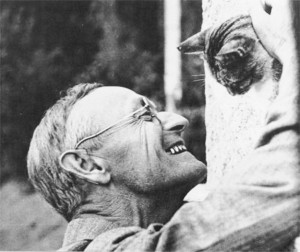What do Truman Capote, Ernest Hemingway, Philip K. Dick, and Jean-Paul Sartre have in common?
Thursday, September 13th, 2012I have a lot of writing to finish between now and Sunday night – I’ll be going at it 24/7. Meanwhile, you might want to check out Buzzfeed’s “30 Renowned Authors Inspired by Cats.” There’s also more at Writers and Kitties.
Mark Twain was an obvious choice. But I combed through to see if they were going to remember some of the world’s most famous cat-lovers. Colette, for example, who famously said, “Plus je connais les hommes, plus j’aime mes chats.”
She’s there, along with Truman Capote, Ernest Hemingway, Edgar Allan Poe, Philip K. Dick, Hermann Hesse, Edward Gorey, George Plimpton, Jacques Derrida, W.H. Auden, and Jean-Paul Sartre make the cut. But where’s T.S. Eliot, for goodness sake?
A few other notables were missed. Where is Joseph Brodsky and his famous cat Mississippi?
I’m not entirely sure Vikram Seth is a cat-lover, but I think he must be. The gnarly old tomcat Charlemagne, in The Golden Gate, is one of the great literary cats. I could find no photo of him with cats – only this from Delhi Walla, which is as close as I’m going to get tonight. And since my own copy of Golden Gate is loaned out to a good cause, I found this sole sonnet (the novel is composed of Pushkin tetrameter sonnets), in which the lawyer John is warned of his romantic competition for the heart of fellow attorney Liz. I like the way these fleet, four-footed sonnets fit onto wordpress better, next to a photograph, without awful line breaks:
Ah, John, don’t take it all for granted.
Perhaps you think Liz loves you best.
The snooker table has been slanted.
A cuckoo’s bomb lies in the nest.
Be warned. Be warned. Just as in poker
The wildness of that card, the joker
Disturbs the best-laid plans of men,
So too it happens, now and then,
That a furred beast with feral features
(Little imagined in the days
When, cute and twee, the kitten plays),
Of that familiar brood of creatures
The world denominates a cat,
Enters the game, and knocks it flat.
Speaking of Vikram Seth, let’s take a moment to give equal time to dogs. I have in mind one that played prominently in Seth’s novel, An Equal Music. It’s St. Augustine’s small white Maltese dog in Vittore Carpaccio‘s Saint Augustine in His Study, in Venice’s Scuola di San Giorgio degli Schiavoni. It’s from Carpaccio’s mature period – he began it in 1502 and completed it in 1507. It’s one of seven panels he made, still in the Schola, depicting the guild’s patron saints.
On Vikram Seth’s authority, I shlepped to the Schola a decade or so ago. It’s tucked away on one of Venice’s sidestreets and not easy to find. It was worth it. The schola is dark and mysterious and pure magic. The painting everything he said it would be.
Highly recommended.
.
.

















 Way over in England, they heard about Anis Shivani’s Huffington Post piece on the
Way over in England, they heard about Anis Shivani’s Huffington Post piece on the 
